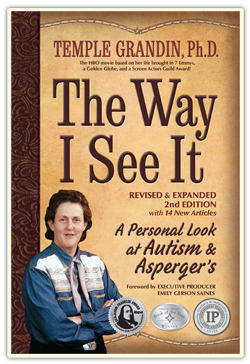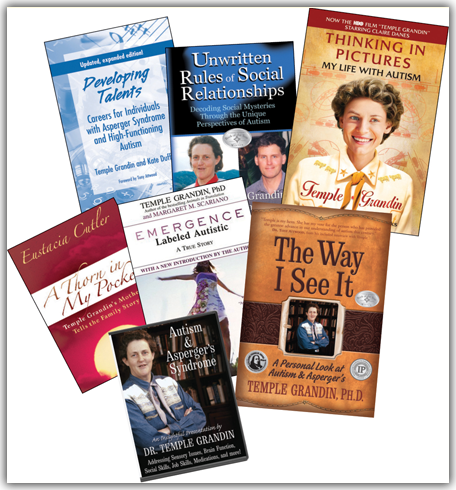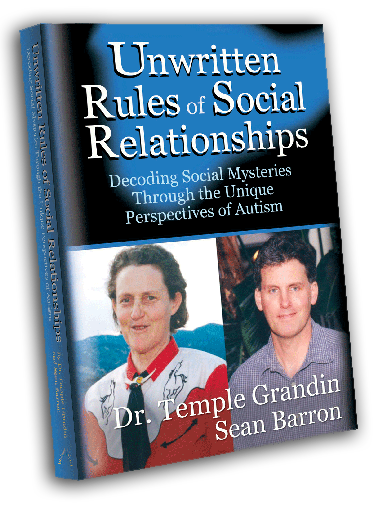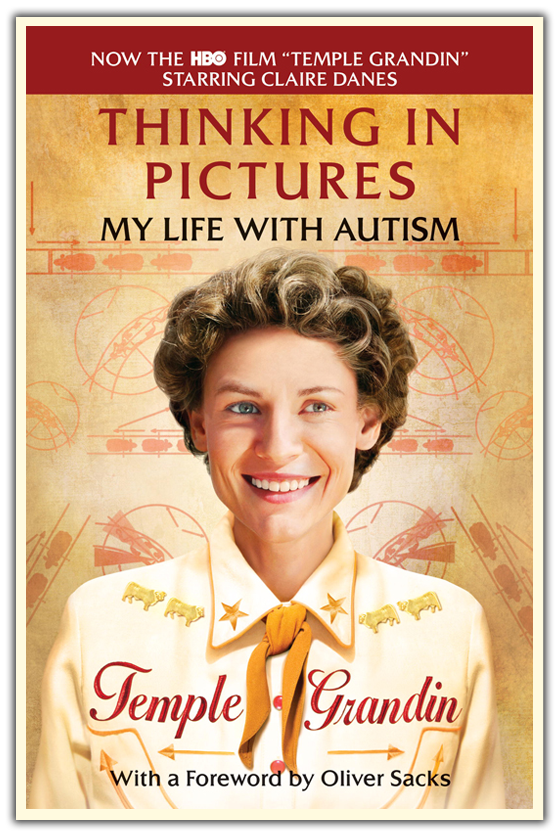Temple Responds to Questions!
The following are some of the questions, and Temple's answers, recently asked via this website. If you go to the icon on the left hand side, you too can ask a question that may be printed here. We will print only your first name for confidentially reasons.
QUESTION: Do you think Autism is reversible by biomedical intervention?
-- Nicholas
ANSWER: Some biomedical interventions can bring about some significant improvements. Some of the most effective ones would be dairy free, wheat/gluten free and sugar free. These dietary interventions work for some people and for some they do not. Usually about 20% see results. For dairy free, within one month, for wheat/gluten free, within one to three months and with sugar free, a months time or shorter.
If you check back on my website in a couple of weeks, I will have a more detailed answer to your question listed under FAQs.
-- Temple
QUESTION: I have been working with my only son for 28 years. He has AS and is now just graduated from the Florida Atlantic University with a major in commercial music. He is waiting to attend McGill University in Canada. He feels he can do better in recording arts and technologies through a one year program that will give him a Masters degree.
Our concern is his ability to live by himself and to handle legal issues after the deaths of my husband and myself. As you can see he is smart to study and will most likely have a job in the area that he chooses. But how will he deal with the real world and the tricky people?
To us, our son is very kind and can only view society in the positive light. Do we need to create a trust for someone to take care of his assets, investments and other money issues?
-- Tassy
ANSWER: For someone that has never lived away from home, it may be best to make a slow transition to independent living. Maybe he could get an apartment locally, close by, before moving to Canada. This way family and friends will be close should he need any help and they can check on him.
As for the Trust, you will need to seek legal council – that is out of my area of expertise.
-- Temple
QUESTION: I am reading your book, “Animals Make Us Human” and am really enjoying it. I have four Siberian Huskies. A family group of three plus another younger male from the same breeder. They are operating like a natural pack. I was wondering why Siberians alone maintain all 15 wolf-like characteristics?
-- Gayle
ANSWER: Different breeds of dogs have differing amounts of wolf-like traits. Some retain more wolf-like traits than others. There is a list of dogs with wolf-like traits in my book, “Animals in Translation”. The dog with the least amount of wolf-like traits is the King Charles Spaniel and the dog with the most, is the Siberian Huskie. I would like to say, should your dog show any signs of aggressive behavior, you should see a qualified dog behavior specialist.
-- Temple
QUESTION: I am sorry this is not an actual question. However, I am a special education teacher in Australia working with many autistic children. I have just watched your HBO movie. I have to say my eldest child and I sat there totally enthralled in your story (he has many traits of ASD, but falls into the gray area of the spectrum). I commend you on your life works and that of allowing this story to be told in such an effective way. You have certainly opened my eyes to the inner mind of someone who has autism. And done so in such a way I have never been able to see through my young students. They are often not able to convey this.
So, I would like to say thank you to you, you are indeed an inspiration to me. I will be using you as an example to some of my students when they feel it is all just too hard. Life is just opening another door for them and you have for me.
-- Erika
ANSWER: Thank you for your kind words. It makes me happy to be seen as a leader for young people. I am happy you liked the HBO movie. I think Claire Danes did a great job of portraying me. I am glad you think the movie is inspirational.
-- Temple
QUESTION: My brother, age 69, was diagnosed with Asperger’s about ten years ago. His very different ways were easy to detect when he was very young. Now, he is starting to withdraw more and more into his very limited, routine driven lifestyle. I think he would benefit from an Asperger’s support group or perhaps a counselor very familiar with high functioning autistic adults. He lives in Glendale, CA. Any ideas would be appreciated.
My wife and I enjoyed learning about your life experiences. Your courage is inspirational.
-- Howard
ANSWER: The best thing to do to help your brother would be Google “Adult Asperger’s support groups” in Glendale, California. This will give him the opportunity to meet up with people just like himself. There should be many to choose from so he can find a good fit. If you find there are none in the immediate area, then check surrounding areas to Glendale.
-- Temple
QUESTION: I am amazed by your presentation that I viewed on line! I have a 9 year-old son with autism and he is verbal. He also has epilepsy, visual impairments, ADHD, a heart condition and Attention deficit disorder. How do I get the school to understand they need special training in educating my son? It seems to me he goes to school and is given the same tasks day after day after day.
I understand he needs consistency, but how do they tap into his gifts? He has a love for collections! When he plays, everything must go together. What type of learner would you say that is?
In your presentation, you mentioned we need the people of the autism community to solve some of our world problems; like new energy sources and other major resource problems. Thank you for reminding me just how valuable my son really is to society.
-- Lisa
ANSWER: When you have problems with a school or educational facility, part depends upon the school and part depends upon the teacher. Some are helpful and some are not. I suggest you join a local parent support group. This will help you find other parents that can give you suggestions on educational alternatives.
I would also suggest you get my book, “Developing Talents”. Nine years old is not too young to start helping your son form a career from what his interests are.
-- Temple
QUESTION: I recently met a young Vietnamese couple concerned about their four year-old son. They think he is autistic, but the local school system says it is too soon to test him. He has attended a preschool for speech, but little progress has been made. He speaks only a dozen words and still wears diapers.
At one time, he could count to ten, but now only counts to three. My question is, does speaking Vietnamese at home affect his ability to learn? Is this adding confusion to his learning?
Both parents speak English fairly well, but the mother-in-law that takes care of him and his younger sister speaks no English, they tell me she does not play with the children. She is with them for about six hours a day and the parents speak Vietnamese at home as well.
-- Deb
ANSWER: Speaking bi-lingual is OK and most likely not a problem for the child. But it is imperative they get him into an Early Intervention Program now! It is possible to diagnose autism in children as young as two years of age and even younger.
The parents should join up with a local support group to help them connect with other parents.
-- Temple
QUESTION: My 13 year-old higher functioning, ASD son has recently begun frequent, involuntary movements, which I’m afraid are seizures. An EEG is scheduled; an MRI will be next.
Do you know much about seizures and autism and treatments for them? I had read that these affect 1 in 4 kids with autism around the time of puberty and that vitamin B6 and magnesium may help. He is also quite hyperactive with anxiety and OCD behaviors. We’ve been trying to find him help for these issues – largely without cusses – so far we have avoided prescription drugs, though we are ready to go down that path. Now, our focus has shifted to the seizure-like activity.
-- Donna
ANSWER: My suggestion is you visit a good Neurologists as soon as possible for the involuntary movements he is experiencing. Make sure you disclose all medication he is taking plus supplements and over the counter drugs.
-- Temple
QUESTION: I am the father of a 10 year-old boy with Asperger’s Syndrome. He is a joy! Very intelligent, kind hearted – all the things a father could ever want in a son. He was diagnosed when he was 4, but my wife and I never shared that with him because we thought it may make him think less of himself.
Now that he is 10, he is telling us that he sees a difference between himself and other people. He is often bothered and confused by it. I was wondering, in your opinion, is it better for a child to know and understand their condition?
-- Chris
ANSWER: If your son is asking questions, it is definitely better to tell him the truth. I would suggest you read my book, “Emergence”. A good book to explain the syndrome to your son is, “Asperger’s, Huh?”.
-- Temple
QUESTION: I am a 40-something, totally blind-from-birth, woman who also suspects mild Asperger’s. I have always been fascinated with how body language works and would like to be involved in coordinating a day long workshop to help myself and others interested in learning more about non-verbal cues, their meanings, how to practice them, etc. I think there could be considerable overlap in populations interested in attending. Have you ever heard of such a workshop? If so, I would like to connect with those in eastern Connecticut who might share my interest and be able to help set this up.
-- Sandra
ANSWER: I have not heard of a workshop for the blind that deals with autism, also. I am sure there are more people like you that are interested in it. You should Google “Meet up Groups”, then the words “blind – autism”, with your City and State. That should give you groups to choose from that would be a good fit for you.
-- Temple
QUESTION: I work as a skills counselor for many children with autism in the rural Midwest. Many of my clients live on farms. I have utilized your story in many ways to provide hope, motivation and a guiding light for several of my clients and their families.
I think creating a video for individuals who have difficulty processing – for instance the HBO movie or the BBC special (which are really geared toward explaining things from the perspective of someone who hasn’t lived it) would be a great way to share your story with more people.
-- Jackie
ANSWER: I am glad you liked the BBC Special. I think the HBO movie is a very accurate portrayal of my life. Claire Danes did a great job playing me. I have a few videos on “Autism and Asperger’s”. One with that name, offered by Future Horizons, was recorded live at a conference where I spoke for them. In this video, I talk about sensory issues and my visual thinking.
-- Temple
QUESTION: I am a stay at home mom and homeschooler and have provided all of my daughter’s therapy and homeschooling. I credit her amazing progress to the one-on-one time we’ve had for years. She inspired me to write children’s books about autism that also nurture the parent. I also so-host a radio program with Leonora Gregory from Canada. My gift book series is a sponsor of one of the awards that will be given at the 2nd annual Naturally Autistic People Awards event in Vancouver. I would like to send you complimentary copies of my books.
Thank you, Temple, for everything you’ve done for me and my family, we adore you!
-- Annie
ANSWER: I am happy that you have spent one on one time with your daughter. It is important to teach turn taking and manners at a young age.
-- Temple
Temple Speaks Out on Sensory Issues!
I have been talking and writing about sensory problems for over 20 years, and am still perplexed by many people who do not acknowledge sensory issues and the pain and discomfort they can cause. A person doesn't have to be on the autism spectrum to be affected by sensory issues.
For more information on sensory issues, please go to www.sensoryworld.com.
Dr Temple Grandin, The Way I See It
TEMPLE GRANDIN MOVIE WINS 7 EMMY AWARDS!!
The very talented cast and crew of the HBO film Temple Grandin received most of the major awards in their catagory! It won for Best Made-for-Television Movie, Best Director, Best Lead Actress, Best Supporting Actress, Best Supporting Actor, Best Music Composition, and Best Camera Editing at the 62nd Emmy Awards on Sunday August 29, 2010.
Temple’s unforgettable presence made an enormous impact on the ceremony, as she praised Claire Danes for her amazingly accurate portrayal of her, and acknowledged her mother from the podium.
Temple's latest book The Way I See It encompasses her ideas about dealing with autism.
Time Magazine honors Temple!
Temple was recently named one of the Time Magazine 100 most Influential people in the world. She was recognized for her work as a world-famous animal scientist and autism self-advocate.
 The list, now in its seventh year, recognizes the activism, innovation, and achievement of the world's most influential individuals. Temple is listed as one of twenty-five "Heroes" of 2010. The author of the article, a professor at Harvard University, writes, "What do neurologists, cattle, and McDonald's have in common? They all owe a great deal to one woman...Temple Grandin….an extraordinary source of inspiration for autistic children, their parents—and all people."
The list, now in its seventh year, recognizes the activism, innovation, and achievement of the world's most influential individuals. Temple is listed as one of twenty-five "Heroes" of 2010. The author of the article, a professor at Harvard University, writes, "What do neurologists, cattle, and McDonald's have in common? They all owe a great deal to one woman...Temple Grandin….an extraordinary source of inspiration for autistic children, their parents—and all people."
As Managing Editor of TIME Magazine, Rick Stengel has said of the list in the past, "The TIME 100 is not a list of the most powerful people in the world, it's not a list of the smartest people in the world; it's a list of the most influential people in the world. They're scientists, they're thinkers, they're philosophers, they're leaders, they're icons, they're artists, they're visionaries. People who are using their ideas, their visions, their actions to transform the world and have an effect on a multitude of people."
Learn more about Temple's amazing story!
Dr. Grandin didn't talk until she was three and a half years old, communicating her frustration instead by screaming, peeping, and humming. In 1950, she was diagnosed with autism and her parents were told she should be institutionalized. She tells her story of "groping her way from the far side of darkness" in her book Emergence: Labeled Autistic, a book which stunned the world because, until its publication, most professionals and parents assumed that an autism diagnosis was virtually a death sentence to achievement or productivity in life.
Dr. Grandin has become a prominent author and speaker on the subject of autism because "I have read enough to know that there are still many parents, and yes, professionals too, who believe that 'once autistic, always autistic.' This dictum has meant sad and sorry lives for many children diagnosed, as I was in early life, as autistic. To these people, it is incomprehensible that the characteristics of autism can be modified and controlled. However, I feel strongly that I am living proof that they can" (from Emergence: Labeled Autistic).
Even though she was considered "weird" in her young school years, she eventually found a mentor, who recognized her interests and abilities. Dr. Grandin later developed her talents into a successful career as a livestock-handling equipment designer, one of very few in the world. She has now designed the facilities in which half the cattle are handled in the United States, consulting for firms such as Burger King, McDonald's, Swift, and others.
Temple Grandin, Ph.D., is now the most accomplished and well-known adult with autism in the world. Her fascinating life, with all its challenges and successes has been brought to the screen. She has been featured on NPR (National Public Radio), major television programs, such as the BBC special "The Woman Who Thinks Like a Cow", ABC's Primetime Live, The Today Show, Larry King Live, 48 Hours and 20/20, and has been written about in many national publications, such as Time magazine, People magazine, Forbes, U.S. News and World Report, and New York Times.. Among numerous other recognitions by media, Bravo Cable did a half-hour show on her life, and she was featured in the best-selling book, Anthropologist from Mars.
Dr. Grandin presently works as a Professor of Animal Science at Colorado State University. She also speaks around the world on both autism and cattle handling. At every Future Horizons conference on autism, the audience rates her presentation as 10+.
Dr. Grandin's current bestselling book on autism is The Way I See It: A Personal Look at Autism and Asperger's. She also authored Unwritten Rules of Social Relationships, Animals Make us Human, Animals in Translation, Thinking in Pictures, Emergence: Labeled Autistic and produced several DVDs. All books and DVD's available through Future Horizons.
Temple Grandin's work continues to inspire millions, drawing superlative reviews such as these:
"Temple is my hero. She has my vote for the person who has provided the greatest advance in our understanding of autism this century."
-Dr. Tony Attwood, world renowned expert on autism spectrum disorders
On The Way I See It:
"Every library, large or small, needs this book on its shelves. Every school, large or small, with the responsibility of educating children with autism or Asperger’s needs the guidance this book offers. . . . Last, and certainly not least, every parent will find within these pages golden nuggets of advice, encouragement, and hope to fuel their day-to-day journey through their child’s autism. . . . The wisdom she offers through this book and its personal reflections on autism will, I’m sure, ring true for many more decades to come."
-Ruth Christ Sullivan, first elected president of the Autism Society of America
On Unwritten Rules of Social Relationships:
"I wish I had this book when Sean was a child. It would have helped me understand Sean so much more."
-Judy Barron, mother of author Sean Barron and co-author of There’s A Boy In Here
"If you’ve ever wondered, ‘What is going through my child’s mind? Why can’t he get social interactions?’ then this book is for you! ‘A-ha!’ moments abound."
-Veronica Zysk, managing editor of award-winning Autism Asperger’s Digest
On Thinking in Pictures:
"An insight into autism that very few people have been able to achieve."
-Bernard Rimland, Ph.D., Institute for Child Behavior Research, San Diego, CA
"What emerges in Thinking in Pictures is the document of an extraordinary human being, one who, in gracefully and lucidly bridging the gulf between her condition and our own, sheds light on the riddle of our common identity."
-Deborah Tannen, author of You Just Don't Understand
"Remarkable. . .Displaying uncanny powers of observation. . .[Temple Grandin] charts the differences between her life and the lives of those who think in words."
-Philadelphia Inquirer












